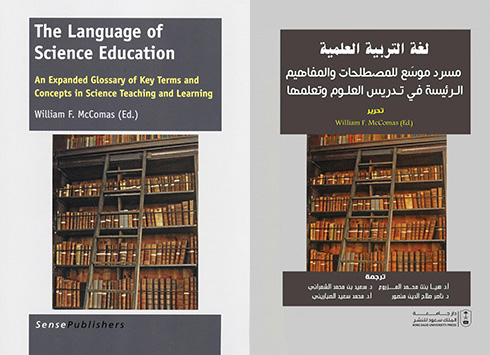William McComas' first doctoral students at the University of Arkansas and at the University of Southern California where he formerly taught were both from Saudi Arabia. So, it's perhaps no surprise that the idea for one of his recent books was suggested by these Saudi contacts.
"My colleagues in Saudi Arabia wondered if there was a resource that would allow them better access to the literature of science education. They had encountered terms that didn't translate in the way they were being used in science education. You could look them up in a dictionary but that definition didn't make sense in the science education context. Essentially, they asked me to write a book to fill this very special need," said McComas, who holds the Parks Family Professorship in Science Education in the College of Education and Health Professions at the U of A.
This conversation encouraged McComas to produce The Language of Science Education: An Expanded Glossary of Key Terms in Science Teaching and Learning, first published in 2014 by Sense Publishers. That was in English. Now, a new edition has come out from King Saud University Press.
"Every discipline uses words in a context-specific fashion," McComas said. "For instance, the term 'informal science learning' could be confusing because it has a unique meaning in our discipline. Even terms such as 'laboratory' and 'inquiry learning' could require explanation."
His former students -- now Saudi collaborators -- Hiya Almazroa, currently a professor at Princess Nourah bint Abdulrahman University, and Saeed Alsharmani, associate professor and head of The Excellence Research Center of Science and Mathematics Education at King Saud University, suggested a list of terms used specifically in science education.
McComas sent these to other science educators for review and to make suggestions for additions. Then, he worked with a team of graduate students and together they researched primary sources to create definitions. Each term in the book has a simple, one- or two-sentence definition followed by a more in-depth discussion of its origin and use in the context of science education.
The original book has been well-received and is cited frequently, McComas said, so he decided to expand on the idea. Now, he and Conra Gist, an assistant professor of curriculum and instruction, are working on one that will be a glossary of the special language of curriculum studies.
Another U of A faculty team is working on a book detailing the special language of mathematics education. It is led by Shannon Dingman, an associate professor in the mathematical sciences department in the J. William Fulbright College of Arts and Sciences, and includes Kim McComas, clinical assistant professor, Laura Kent, associate professor, and Cynthia Orona, assistant professor, all of the College of Education and Health Professions. William McComas is now executive editor of a book series that had its start with little more than a question and a need from the other side of the world.
Topics
Contacts
Heidi S. Wells, director of communications
College of Education and Health Professions
479-575-3138,
